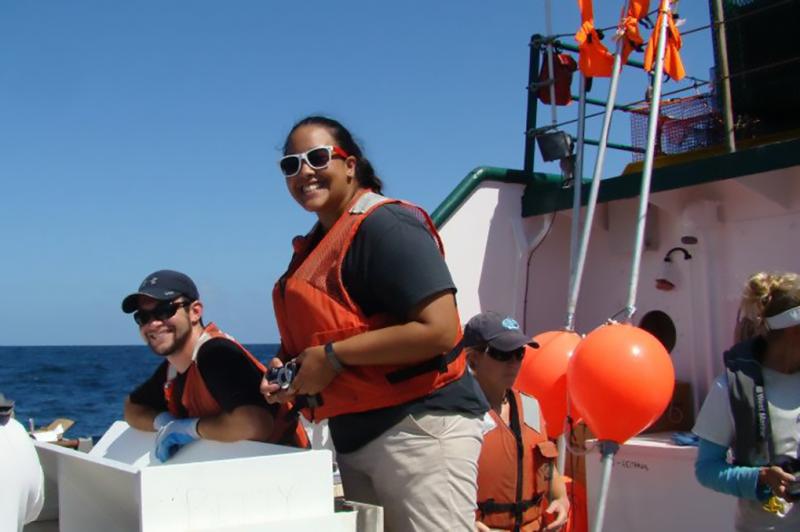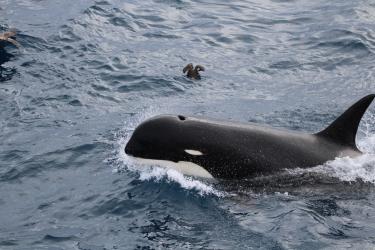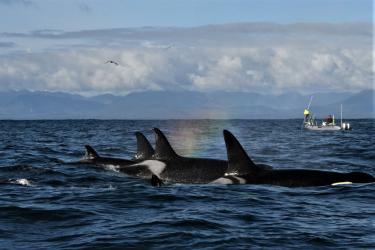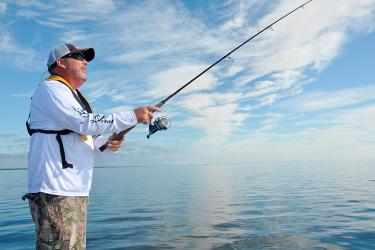What is your key responsibility in the Office of Habitat Conservation?
I work as part of the Damage Assessment Remediation and Restoration Program team at our NOAA Restoration Center, within the Office of Habitat Conservation. Through the program, NOAA and teams of state, tribal, and federal agencies restore habitats after oil spills and hazardous waste releases. I serve primarily as the DARRP monitoring and evaluation coordinator. I engage and coordinate with staff on establishing consistent and cost‐effective approaches to monitoring and evaluation of habitat restoration projects. That helps us document the extent to which the projects have produced the intended benefits to habitat. I also serve as the Southeast regional liaison, provide some support with communications, and wear a couple of other hats to support various DARRP needs.
Where did you grow up? Are there cultural experiences that have influenced or are influencing you from that time?
I grew up in Lima, Peru. Growing up in a coastal city, I spent most of my life near the ocean and most of my summers at the beach—my happy place. When we emigrated to the United States as a family when I was 15, we moved to Georgia. For the first time, I found myself landlocked.
Being away from the coast, and many other things, made the transition difficult. The immigrant experience is as varied as our cultures and a hard one at any age. As a teenager it really shapes who you become and how you react in most situations. Not only was I navigating growing up (as an introvert), but now I was doing it in a new country, a different culture, and in a different language. The expectation to keep your native culture and customs intact while adapting, fitting in, and succeeding in this new environment is huge. But, it can also be a driver to be equally successful in, and embracing of both cultures, and learning to appreciate the intricacies of each. It wasn’t easy getting there, but I think I’ve managed to balance cultural, social, and professional expectations well. I don’t think there is one aspect of my life, personal or professional, that hasn’t been shaped by that experience. It prepared me for better adapting to new environments while also learning to stay true to who I am by preserving traditions and culture.
As for my career choice, it was perhaps unusual for my cultural background but, like I said earlier, being near the water is my happy place. And, I’m lucky to have always had supportive parents that sacrificed a lot to get me where I am today.
What is your educational background?
I went to Florida State University for both undergrad and graduate school. I have a Bachelor’s of Science in Biology and a Master’s of Science in Biological Oceanography.
Are you a member of a community organization, church, or volunteer/mentorship program?
I’m a member of the Latinos@NOAA Employee Resource Group. In pre-pandemic times, I was a volunteer for the Smithsonian Institution’s School Programs Team. I taught kids about science, showing them some of the collection items on the first floor and explaining interesting facts about them.
What habitat restoration work or projects have been especially successful or inspiring to you?
Although I have only been with DARRP for 4 years, being the monitoring and evaluation coordinator and studying historical cases and projects has given me the opportunity to see the progress we’ve made as a program over the last 30 years. We continue to improve and adapt our habitat restoration practice to current conditions and needs.
We’re also currently working to improve the way we implement monitoring across our various restoration projects. I am excited and encouraged to be able to rework some of our monitoring frameworks to contribute to the advancement of restoration practice. I’m hopeful these updates will aid in ensuring our habitat restoration work better supports underserved communities.
Is there a book, quote, or person that influenced you to be the person you are, or enter the field you’re in today?
Quote: An abridged version of a quote from the children’s book, The Little Prince:
“It is madness to hate all roses because you got scratched with one thorn. To give up on your dreams because one didn’t come true ...To throw away all your chances to be happy because you didn’t succeed on the first attempt. I hope that as you go on your way, you don’t give up nor give in.”
People: My parents. I’m very cognizant of their sacrifices for our family. I might have not valued it when I was younger, but I am so much more aware now of their struggles, and their resilience and determination to give their kids as many opportunities as possible. I think my accomplishments are as much mine as they are theirs, and a testament to their sacrifice.
What does National Hispanic Heritage Month mean to you?
Hispanic Heritage Month is a fairly new concept for me given that I didn’t grow up in the United States and it is mostly celebrated here. However, I do see it as an opportunity to celebrate and learn about the diversity of our cultures (we are not a monolith), and to emphasize the contributions of people of Hispanic descent to the United States and around the world.
What advice would you have for today’s youth interested in a government or conservation career?
Getting from point A to point B will be everything but a straight line. Throughout my career there have been peaks and valleys and plenty of setbacks, but the point is to learn from those and keep going. Take the opportunities that were not “planned” because they may lead you to where you want to be.





